英语语法 代词
英语语法 代词
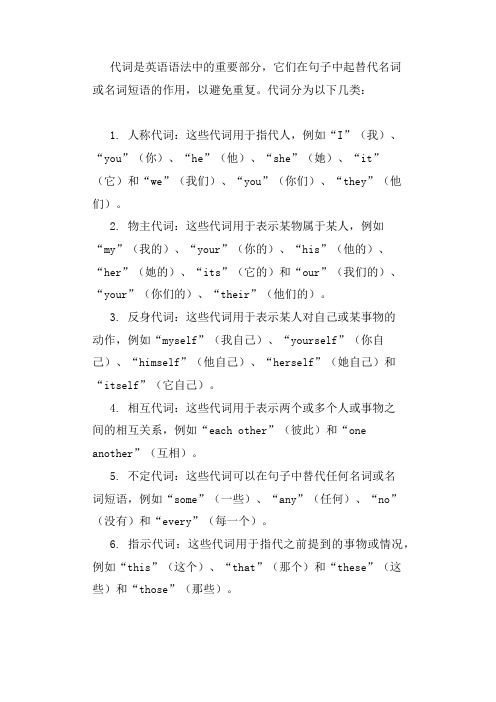
代词是英语语法中的重要部分,它们在句子中起替代名词
或名词短语的作用,以避免重复。
代词分为以下几类:
1. 人称代词:这些代词用于指代人,例如“I”(我)、“you”(你)、“he”(他)、“she”(她)、“it”(它)和“we”(我们)、“you”(你们)、“they”(他们)。
2. 物主代词:这些代词用于表示某物属于某人,例如“my”(我的)、“your”(你的)、“his”(他的)、“her”(她的)、“its”(它的)和“our”(我们的)、“your”(你们的)、“their”(他们的)。
3. 反身代词:这些代词用于表示某人对自己或某事物的
动作,例如“myself”(我自己)、“yourself”(你自己)、“himself”(他自己)、“herself”(她自己)和“itself”(它自己)。
4. 相互代词:这些代词用于表示两个或多个人或事物之
间的相互关系,例如“each other”(彼此)和“one another”(互相)。
5. 不定代词:这些代词可以在句子中替代任何名词或名
词短语,例如“some”(一些)、“any”(任何)、“no”(没有)和“every”(每一个)。
6. 指示代词:这些代词用于指代之前提到的事物或情况,例如“this”(这个)、“that”(那个)和“these”(这些)和“those”(那些)。
在英语语法中,代词的使用需要注意其格(主格、宾格、所有格)和数(单数、复数)。
同时,还要注意避免使用代词时可能出现的歧义,例如当两个名词太相似时,可能会让人不确定代词指的是哪一个。
英语语法 代词
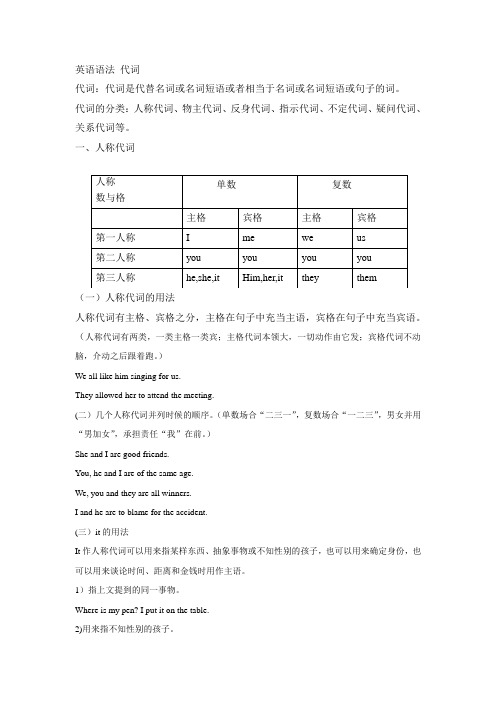
英语语法 代词代词:代词是代替名词或名词短语或者相当于名词或名词短语或句子的词。
代词的分类:人称代词、物主代词、反身代词、指示代词、不定代词、疑问代词、关系代词等。
一、人称代词(一)人称代词的用法人称代词有主格、宾格之分,主格在句子中充当主语,宾格在句子中充当宾语。
(人称代词有两类,一类主格一类宾;主格代词本领大,一切动作由它发;宾格代词不动脑,介动之后跟着跑。
) We all like him singing for us. They allowed her to attend the meeting.(二)几个人称代词并列时候的顺序。
(单数场合“二三一”,复数场合“一二三”,男女并用“男加女”,承担责任“我”在前。
) She and I are good friends. You, he and I are of the same age. We, you and they are all winners. I and he are to blame for the accident. (三)it 的用法It 作人称代词可以用来指某样东西、抽象事物或不知性别的孩子,也可以用来确定身份,也可以用来谈论时间、距离和金钱时用作主语。
1)指上文提到的同一事物。
Where is my pen? I put it on the table. 2)用来指不知性别的孩子。
人称 数与格 单数 复数主格 宾格 主格 宾格 第一人称 I me we us 第二人称 you you you you 第三人称 he,she,itHim,her,ittheythemShe is pregnant. I hope it will be a girl.3)用来确定身份。
Someone is knocking at the door. I don’t know who it is.It’s your mother on the phone.4)谈论时间、距离、天气时作主语。
英语语法填空常见代词

英语语法填空常见代词常见代词是英语语法中的重要部分,它们在句子中起着指代或代替名词的作用。
了解常见代词的用法和特点对于正确理解和运用英语语法是至关重要的。
在本文中,我们将介绍几种常见的代词,并详细解释它们在句子中的使用。
一、人称代词人称代词是指代人的代词,用来代替名词或指代特定的人或人群。
常见的人称代词有:I, you, he, she, it, we, they。
它们在句子中的使用如下:1. I - 代表说话的人。
例句:I am going to the park.(我要去公园。
)2. you - 代表与说话人交流的人或人群。
例句:Can you help me with my homework?(你能帮我做作业吗?)3. he - 代表一个男性。
例句:He is my brother.(他是我的兄弟。
)4. she - 代表一个女性。
例句:She is a teacher.(她是一名教师。
)5. it - 代表一个无生命的物体或动物,或指代事物的名词。
例句:The cat is cute. It has blue eyes.(这只猫很可爱。
它有蓝眼睛。
)6. we - 代表说话人和其他人。
例句:We are going to the movies tonight.(我们今晚要去看电影。
)7. they - 代表除说话人和听话人以外的人或人群。
例句:They are my friends.(他们是我的朋友。
)人称代词在句子中起到了代替名词的作用,使句子更加简洁明了。
二、物主代词物主代词用来代替名词所表示的所有权关系。
常见的物主代词有:my, your, his, her, its, our, their。
它们在句子中的使用如下:1. my - 代表说话人的所有物。
例句:This is my book.(这是我的书。
)2. your - 代表听话人的所有物。
例句:Is this your pen?(这是你的笔吗?)3. his - 代表某人的所有物。
英语语法代词
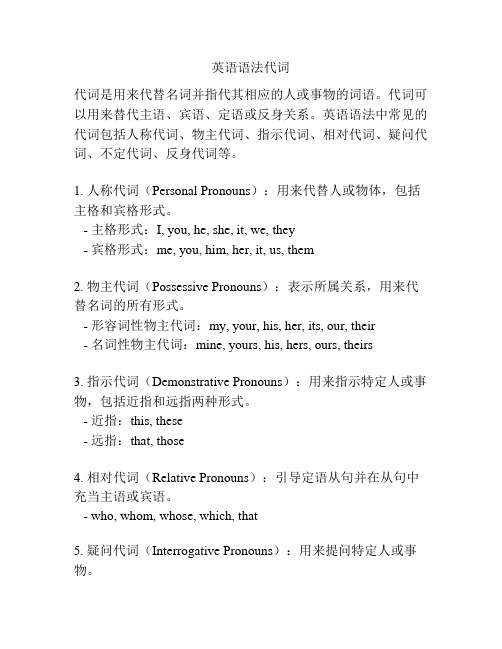
英语语法代词代词是用来代替名词并指代其相应的人或事物的词语。
代词可以用来替代主语、宾语、定语或反身关系。
英语语法中常见的代词包括人称代词、物主代词、指示代词、相对代词、疑问代词、不定代词、反身代词等。
1. 人称代词(Personal Pronouns):用来代替人或物体,包括主格和宾格形式。
- 主格形式:I, you, he, she, it, we, they- 宾格形式:me, you, him, her, it, us, them2. 物主代词(Possessive Pronouns):表示所属关系,用来代替名词的所有形式。
- 形容词性物主代词:my, your, his, her, its, our, their- 名词性物主代词:mine, yours, his, hers, ours, theirs3. 指示代词(Demonstrative Pronouns):用来指示特定人或事物,包括近指和远指两种形式。
- 近指:this, these- 远指:that, those4. 相对代词(Relative Pronouns):引导定语从句并在从句中充当主语或宾语。
- who, whom, whose, which, that5. 疑问代词(Interrogative Pronouns):用来提问特定人或事物。
- who, whom, whose, which, what6. 不定代词(Indefinite Pronouns):指代不确定人或物体的代词。
- some, any, no, all, each, every, few, many, several, someone, anyone, no one, everyone, etc.7. 反身代词(Reflexive Pronouns):表示动作的反身关系。
- myself, yourself, himself, herself, itself, ourselves, yourselves, themselves以上是英语语法中常见的代词,它们在句子中扮演着重要的角色,可以使句子更加简洁明了。
英语语法之代词的总结
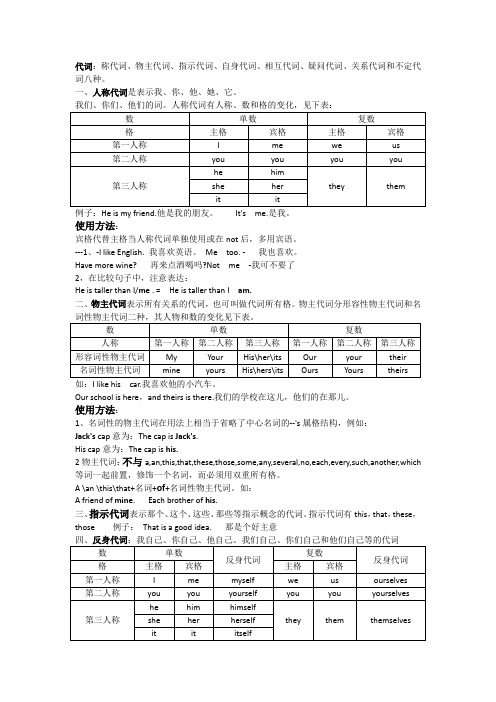
代词:称代词、物主代词、指示代词、自身代词、相互代词、疑问代词、关系代词和不定代词八种。
一、人称代词是表示我、你、他、她、它、我们、你们、他们的词。
人称代词有人称、数和格的变化,见下表:例子:He is my friend.他是我的朋友。
It's me.是我。
使用方法:宾格代替主格当人称代词单独使用或在not后,多用宾语。
---1、-I like English. 我喜欢英语。
Me too. - 我也喜欢。
Have more wine? 再来点酒喝吗?Not me -我可不要了2,在比较句子中,注意表达:He is taller than I/me . = He is taller than I am.二、物主代词表示所有关系的代词,也可叫做代词所有格。
物主代词分形容性物主代词和名如:I like his car.我喜欢他的小汽车。
Our school is here,and theirs is there.我们的学校在这儿,他们的在那儿。
使用方法:1、名词性的物主代词在用法上相当于省略了中心名词的--'s属格结构,例如:Jack's cap意为:The cap is Jack's.His cap意为:The cap is his.2物主代词:不与a,an,this,that,these,those,some,any,several,no,each,every,such,another,which 等词一起前置,修饰一个名词,而必须用双重所有格。
A \an \this\that+名词+of+名词性物主代词。
如:A friend of mine. Each brother of his.三、指示代词表示那个、这个、这些、那些等指示概念的代词。
指示代词有this,that,these,those 例子:That is a good idea. 那是个好主意四、反身代词:我自己、你自己、他自己、我们自己、你们自己和他们自己等的代词She was talking to herself. 她自言自语使用方法:1、有些动词后面跟反身代词:absent, bathe, amuse ,blame, dry, cut ,enjoy, hurt ,introduce ,behave例子:Please help yourself to some fish.请你随便吃点鱼Enjoy yourself 玩的开心愉快introduce yourself 介绍你自己2、第二人称作宾语,要用反身代词。
高中英语语法之 代词

高中英语语法—代词一、概念代词是代替名词的词,可分为八类:人称代词、物主代词、指示代词、反身代词、相互代词、疑问代词、不定代词和关系代词等。
1.人称代词1)人称代词的人称、数和格,如下表所示。
2)人称代词有主格和宾格之分。
通常主格作主语,宾格作宾语。
如:I like table tennis. (I作主语)Do you know him?(him作宾语)3)人称代词还可作表语。
作表语时用宾格。
如:---Who’s is knocking at the door?---It’s me. (me 作标语)4)人称代词在than之后与其他人或事物进行比较时,用主格和宾格都可以。
如:He is older than me.He is older than I am.2. 物主代词1)表示所有关系的代词叫物主代词。
物主代词分形容词性物主代词和名词性物主代词,如下表所示。
2)形容词性物主代词的作用相当于形容词,可在句中作定语。
例如:Our teacher is coming to see us.(our作定语)This is her pencil-box.(her作定语)3)名词性物主代词的作用相当于名词,在句中可用作主语、宾语和表语。
Our school is here, and theirs is there.(theirs作主语)--- Is this English-book yours? (yours作表语)--- No. Mine is in my bag.(mine作主语)I've already finished my homework. Have you finished yours?(yours作宾语)3. 指示代词指示代词包括:this,that,these,those。
1) this和these一般用来指在时间或空间上较近的事物或人,that和those则指时间和空间上较远的事物或人,例如:This is a pen and that is a pencil.We are busy these days.In those days the workers had a hard time.2)有时that和those指前面讲到过的事物,this 和these则是指下面将要讲到的事物,例如:I had a cold. That's why I didn't come.What I want to say is this:pronunciation is very important in learning English.3)有时为了避免重复提到的名词,常可用that或those代替,例如:Television sets made in Beijing are just as good as those made in Shanghai.4)this 在电话用语中代表自己,that 则代表对方。
英语语法-代词

英语语法——代词概说用来代替名词,数词或上下文的词句等的词称为代词。
可分为:人称代词,物主代词,反身代词,指示代词,不定代词,疑问代词,相互代词和关系代词。
一.人称代词表示人称的代词叫做人称代词。
人称代词既可指人、也可指物,有人称、数和格的变化。
数单数复数格主格宾格主格宾格第一人称I me we us第二人称you you you you第三人称he、she、it him、her、it they them人称代词的用法1.人称代词的主格通常作主语,宾格通常作动词的宾语、介词的宾语或表语等They want to go to the shopping mall.The dog bit him.They took good care of us.(介词宾语)If I were him, I would take her advice.(表语)2.人称代词单独使用时通常用宾格而不用主格。
--I’d like to stay here for another week.--Me,too.3.人称代词做主语的排列顺序排列顺序举例人称代词的单数形式按第二、三、一排列以示礼貌You、Jack and I passed the exam.承认错误或自我批评时,把说话人I(我)放在首位(除了You and 这一固定结构)I and Jim are to blame.我和吉姆该受批评You and I are both wrong.你和我都错了。
“男士优先“He and she are both my friend my good friends.二.物主代词表示所有关系的代词叫做物主代词,分为形容词性物主代词和名词性物主代词。
数人称形容词性物主代词名词性物主代词单数第一人称my mine第二人称your yours第三人称his、her、its his、hers、its复数第一人称our ours 第二人称your yours 第三人称their theirs1.形容词性物主代词用法:可作定语相当于形容词I love my work in the hospital.2.名词性物主代词=形容词性物主代词+名词,可用作主语、宾语和表语Ours is a socialist country.I didn't borrow her dictionary. I borrowed his.Whose pencil is this?-It is hers.She is a friend of mine=She is a friend of my friends.三.反身代词表示主语发出的动作反射到施动者本身。
英语语法 什么是代词
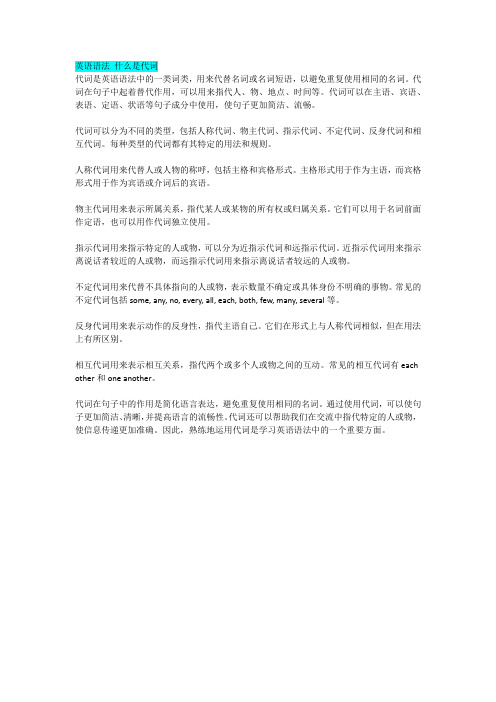
英语语法什么是代词代词是英语语法中的一类词类,用来代替名词或名词短语,以避免重复使用相同的名词。
代词在句子中起着替代作用,可以用来指代人、物、地点、时间等。
代词可以在主语、宾语、表语、定语、状语等句子成分中使用,使句子更加简洁、流畅。
代词可以分为不同的类型,包括人称代词、物主代词、指示代词、不定代词、反身代词和相互代词。
每种类型的代词都有其特定的用法和规则。
人称代词用来代替人或人物的称呼,包括主格和宾格形式。
主格形式用于作为主语,而宾格形式用于作为宾语或介词后的宾语。
物主代词用来表示所属关系,指代某人或某物的所有权或归属关系。
它们可以用于名词前面作定语,也可以用作代词独立使用。
指示代词用来指示特定的人或物,可以分为近指示代词和远指示代词。
近指示代词用来指示离说话者较近的人或物,而远指示代词用来指示离说话者较远的人或物。
不定代词用来代替不具体指向的人或物,表示数量不确定或具体身份不明确的事物。
常见的不定代词包括some, any, no, every, all, each, both, few, many, several等。
反身代词用来表示动作的反身性,指代主语自己。
它们在形式上与人称代词相似,但在用法上有所区别。
相互代词用来表示相互关系,指代两个或多个人或物之间的互动。
常见的相互代词有each other和one another。
代词在句子中的作用是简化语言表达,避免重复使用相同的名词。
通过使用代词,可以使句子更加简洁、清晰,并提高语言的流畅性。
代词还可以帮助我们在交流中指代特定的人或物,使信息传递更加准确。
因此,熟练地运用代词是学习英语语法中的一个重要方面。
英语语法代词
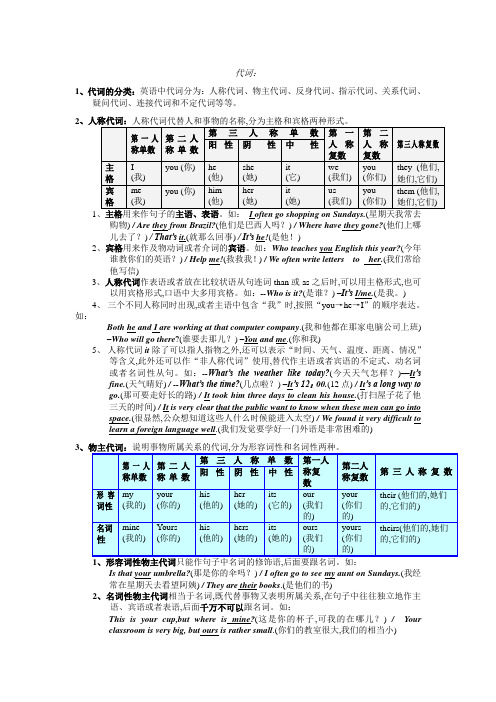
代词:1、代词的分类:英语中代词分为:人称代词、物主代词、反身代词、指示代词、关系代词、疑问代词、连接代词和不定代词等等。
21I often go shopping on Sundays.购物) / Are they from Brazil?(他们是巴西人吗?) / Where have they gone?(他们上哪儿去了?)/ That’s it.(就那么回事)/ It’s he!(是他!)2、宾格用来作及物动词或者介词的宾语。
如:Who teaches you English this year?(今年谁教你们的英语?) / Help me!(救救我!) / We often write letters to her.(我们常给他写信)3、人称代词作表语或者放在比较状语从句连词than或as之后时,可以用主格形式,也可以用宾格形式,口语中大多用宾格。
如:--Who is it?(是谁?)–It’s I/me.(是我。
)4、三个不同人称同时出现,或者主语中包含“我”时,按照“you→he→I”的顺序表达。
如:Both he and I are working at that computer company.(我和他都在那家电脑公司上班) –Who will go there?(谁要去那儿?) –You and me.(你和我)5、人称代词it除了可以指人指物之外,还可以表示“时间、天气、温度、距离、情况”等含义,此外还可以作“非人称代词”使用,替代作主语或者宾语的不定式、动名词或者名词性从句。
如:--What’s the weather like today?(今天天气怎样?)—It’sfine.(天气晴好) / --What’s the time?(几点啦?)–It’s 12:00.(12点) / It’s a long way togo.(那可要走好长的路) / It took him three days to clean his house.(打扫屋子花了他三天的时间) / It is very clear that the public want to know when these men can go intospace.(很显然,公众想知道这些人什么时候能进入太空) / We found it very difficult tolearn a foreign language well.(我们发觉要学好一门外语是非常困难的)3Is that your umbrella?(那是你的伞吗?) / I often go to see my aunt on Sundays.(我经常在星期天去看望阿姨) / They are their books.(是他们的书)2、名词性物主代词相当于名词,既代替事物又表明所属关系,在句子中往往独立地作主语、宾语或者表语,后面千万不可以跟名词。
英语代词语法

练习(2) 选词填空: 1. Your bedroom is bigger than ______________.(my, mine) 正确答案:mine
d. 无人称主语或宾语,尤指天气、时间或距离。如: It’s raining. It’s twenty miles from here to Shanghai.
练习(1): 选词填空 1. Mum and _________ (I, me)went shopping yesterday. 正 Nhomakorabea答案:I
1)形容词性物主代词和名词性物主代词 --形容词性物主代词修饰名词,放在名词前,不可单独使用。如: This is her book. Your school is nor very far. Isn’s it?
--名词性物主代词相当于“形容词性物主代词+名词”,在句子中作名词的作用, 可以单独使用。如:
注意: 1. 除了none外,合成不定代词通常不可接of结构。 2. 合成不定代词后通常可加else,如something else(另外的东西),
anyone else(其他人)等代词的所有格形式为something else’s, anyone else’s 3. 修饰合成不定代词的定语(形容词等)要放在他们后面。如:
Little: little by little ; in a little while
Few: a man of few words; have a few words with sb.
初中英语语法代词讲解

初中英语语法代词讲解Newly compiled on November 23, 2020初中英语语法代词代词:为了避免重复而用来代替其他词的词。
种类:1) 人称 2) 物主 3) 反身4) 指示 5)不定6) 疑问7) 相互代词:each other, one another互相,其所有格加-’s8) 关系代词:which, who,that,whom,whose等引导定语从句9) 连接代词:who, whom, whose, what, which, whatever, whichever, whoever, whomever10)替代词:one(单数), ones(复数)用于替代前面出现的同类事物。
但ones必须和形容词连用。
如果替代的名词时无形容词在前,则用some, any,而不用ones。
如:Have you bought any rulers Yes,I 've bought some.一、人称代词1.人称代词的形式2.人称代词的句法功能3.人称代词的排列顺序(单数231,复数123)当两个以上的人称代词一起作主语时,单数按二、三、一人称排列(即you, he / she, I);复数按一、二、三人称排列(即we, you, they)。
但是如果做错了事需要承担责任时,要把说话人(I)放在第一位。
如:It was I and John that made her angry. 是我和约翰惹她生气了。
二、物主代词1.物主代词的形式2.物主代词的基本用法3.物主代词的特殊用法在双重所有格中只能用名词性物主代词。
如:我的一个朋友a friend of mine ,她的一个同学 a classmate of hers , each brother of his.三、反身代词1.反身代词的形式反身代词又叫自身代词,表示动作返回到动作发出者本身。
2.反身代词的句法功能3.由反身代词构成的习惯用语①help oneself to 随便吃……②come to oneself 苏醒过来,醒悟,恢复知觉③dress oneself 自己穿衣服④say to oneself 自言自语⑤enjoy oneself 玩得开心⑥lose oneself in迷路于,全神贯注于…之中,消失于⑦teach oneself 自学⑧look after oneself ⑨by oneself 亲自learn……by oneself 自学…leave one by oneself 把某人单独留下hurt oneself 伤了自己make yourself/yourselves at home 不必拘束四、指示代词1. that 用来代替前面提到的不可数名词,those代替复数名词。
英语语法:代词
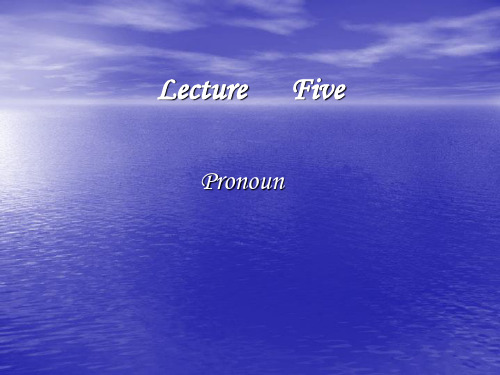
Other usage of possessive pronouns 一.Determinative genitive pronoun In the following structure, we can only use “the” touch sb. on the head hit sb. in the face hit sb. on the nose strike sb. in the chest catch sb. by the arm
he is interested. ----Anybody can attend the meeting if ___ In informal style, we can use plural form.( depend on notional concord)
such as: everything, something, nothing, anything Eg: Anything on the table can be thrown away, can‟t ___? it
The change of the personal pronoun in person, number and case:
number
singular
object me you him her it subject we you they they they
plural
object us you them them them
Indefinite pronoun concord in number and person
such as: anybody,everybody,nobody,anyone, someone, everyone,no one, whoever and person, in formal style, we can use “he, his, him”.
高中英语语法知识:代词

高中英语语法知识:代词代词(英文pronoun,简称pron.),是指代名词或一句话的一种词类。
大多数代词具有名词和形容词的功能。
英语中的代词,按其意义、特征及在句中的作用分为:人称代词、物主代词、指示代词、反身代词、相互代词、疑问代词、关系代词、连接代词、不定代词和替代词十种。
人称代词分为主格(如:I, you, he等)和宾格(如:me, you, him)物主代词分为形容性物主代词(如:my, his, your)和名词性物主代词(如:mine, his, yours)指示代词常见的有四个:this这,that那, these这些, those那些反身代词如:myself我自己,himself他自己,themselves他们自己疑问代词用在特殊疑问句中。
有:who, whom, whose, what, which。
如:Who is that boy? What do you like?不定代词如:some一些, many许多, both两个都, everything, everybody等关系代词引导定语从句。
如:This is the boy who won the race.相互代词指each other 与one another,意为“互相”连接代词疑问代词在引导从句时,都称为连接代词,包括who, whom, whose, what, which, whoever,whomever, whichever, whatever,一共九个。
如:It is clear enough what she meant. 她是什么意思很清楚。
(引导主语从句)I don’t care what they think. 他们怎么想我不管。
(引导宾语从句)替代词that,one(单数),ones(复数)。
为避免重复,在一个句子中常用替代词替代前面已经提到过的事物。
英语语法代词讲解
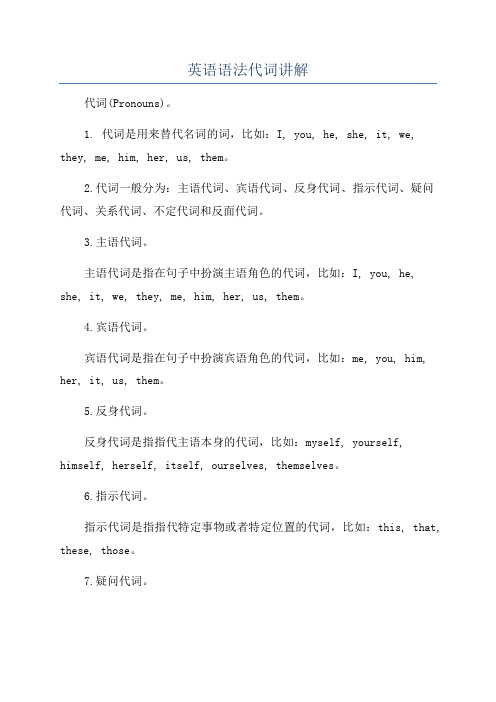
英语语法代词讲解代词(Pronouns)。
1. 代词是用来替代名词的词,比如:I, you, he, she, it, we, they, me, him, her, us, them。
2.代词一般分为:主语代词、宾语代词、反身代词、指示代词、疑问代词、关系代词、不定代词和反面代词。
3.主语代词。
主语代词是指在句子中扮演主语角色的代词,比如:I, you, he, she, it, we, they, me, him, her, us, them。
4.宾语代词。
宾语代词是指在句子中扮演宾语角色的代词,比如:me, you, him, her, it, us, them。
5.反身代词。
反身代词是指指代主语本身的代词,比如:myself, yourself, himself, herself, itself, ourselves, themselves。
6.指示代词。
指示代词是指指代特定事物或者特定位置的代词,比如:this, that, these, those。
7.疑问代词。
疑问代词是指用来引导疑问句的代词,比如:who, whom, which, what, whose。
8.关系代词。
关系代词是指指代一个句子中某一元素的代词,比如:who, whom, that, which, whose。
9.不定代词。
不定代词是指不指代特定的事物的代词,比如:anyone, anything, everyone, everything, nobody, nothing, somebody, something。
10.反面代词。
反面代词是指强调对前面的否定意思的代词,比如:neither, none, nobody, no one, nothing。
小学英语基础语法2-代词

小学英语基础语法—代词代词(Pronoun):就是用来代替名词的词。
如:表示“你”、“我”、“他”、“这”、“那”等的词就是代词。
英语中的代词通常可分为:人称代词(personal pronouns)、物主代词(possessive pronouns)、指示代词(demonstrative pronouns)等类型。
一、人称代词(Personal Pronouns)英语中,像I,he,she,we,it,you等指代人称的词被称作人称代词。
用来替代主语位置上的名词。
根据人称关系可分为第一人称代词、第二人称代词和第三人称代词。
第一人称代词有I和we两个,I意思是“我”,表示单数,we意思是“我们”,表示复数。
第二人称代词只有you一个,意思是“你”或“你们”,既可以表示单数,又可以表示复数。
第三人称代词有四个,分别是he,she,it和they。
he用来指代“他”,she用来指代“她”,it用来指代“它”,均表示单数。
they用来指代“他们”、“它们”或“她们”,表示复数。
人称代词的单复数可以总结为下面的表格:人称代词的宾格:英语中像me,you(你),him,her,it,us,you(你们),them这些词也是人称代词。
它们一般放在动词的后面做宾语。
一般情况下,主语出现在句首,而宾语出现在句中或句尾。
例如:I hide in the garden. Can you find me?这句中的me就是主语I 的宾格,在句中作宾语。
所有人称代词都有相应的主格和宾格形式。
我们可以把人称代词的主格和宾格归纳总结为下面的表格:二、物主代词(Possessive Pronoun)在汉语中我们经常会用到“我的”、“你的”、“他的”等词,在英语中所对应的这类词就是物主代词。
每一个人称代词都有相对应的物主代词。
例如I的物主代词就是my,它常出现在名词的前面,表示“我的……”。
同样,其他物主代词的用法跟my相同,也是出现在名词的前面,表示相应名词的所属关系。
初中英语语法—代词

sb. think + it + adj. to do feel it’s也对!
1.I found ___ very difficult to make progress
in my study .
A. it’s
B. it
C. that
2. It is great fun __ surfing on the Internet . A. go B. to go C. going
A. one B. it C. that
3. I can’t find my hat . I think I must buy__.
A. it B. one C. that
③ 固定句型
1. 做某事情对某人来说是… It is + adj. (+for sb.) +to do sth.
2. 轮到某人做… It’s one’s turn to do sth.
⑩ 照顾自己 look after oneself
1.The man is rich , he can buy ___ a lot of things . A. he B. his C. himself
2. --- What a lovely card ! Where did you buy it? --- I made it by _____.
who, whose, whom, that, which.
一.人称代词
数
单数
复数
人称 格 主格 宾格 主格 宾格
第一人称 I 第二人称 you
he 第三人称 she
it
me we us you you you him her theythem it
英语语法:代词
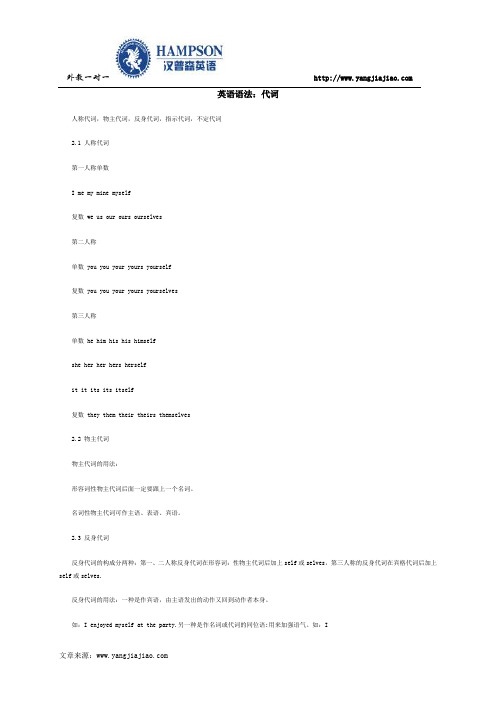
外教一对一英语语法:代词人称代词,物主代词,反身代词,指示代词,不定代词2.1 人称代词第一人称单数I me my mine myself复数 we us our ours ourselves第二人称单数 you you your yours yourself复数 you you your yours yourselves第三人称单数 he him his his himselfshe her her hers herselfit it its its itself复数 they them their theirs themselves2.2 物主代词物主代词的用法:形容词性物主代词后面一定要跟上一个名词。
名词性物主代词可作主语、表语、宾语。
2.3 反身代词反身代词的构成分两种:第一、二人称反身代词在形容词:性物主代词后加上self或selves,第三人称的反身代词在宾格代词后加上self或selves.反身代词的用法:一种是作宾语,由主语发出的动作又回到动作者本身。
如:I enjoyed myself at the party.另一种是作名词或代词的同位语;用来加强语气。
如:I外教一对一 can do it myself.2.4 指示代词指示代词的特殊用法:(1)为了避免重复,可用that,those代替前面提到过的名词,但是this,these不可以。
(2)this,that有时可代替句子或句子中的一部分。
2.5 不定代词one,some,any,other,another,all,both,each,neither,many,much等。
英语语法——代词

him
his
his
himself
阴性
she
her
her
hers
herself
中性或非人称
it
it
its
its
itself
复数
中性
they
them
their
theirs
themselves
功用
主语、表语、主补
宾语、表语、介宾
宾语
主语、宾语、表语、介宾
宾语、介宾、表语、同位语
3.指示代词(Demonstrative Pronouns)
主语、宾语、表语、介宾,可单独使用
反身代词
ReflexivePronouns
人身代词+self构成
宾语、表语、介宾、同位语
相互代词
ReciprocalPronouns
指示代词
Demonstrative Pronouns
表示“这个”、“那个”、“这些”、“那些”等指示概念的代词
疑问代词
InterrogativePronouns
3.人称代词、物主代词、反身代词
类别
人称代词
物主代词
反身代词
主格
宾格
形容词性
名词性
形式
第一
人称
单数
I
me
my
mine
myself
复数
we
us
our
ours
ourselves
第二
人称
单数
you
you
your
yours
yourself
复数
you
you
your
yours
- 1、下载文档前请自行甄别文档内容的完整性,平台不提供额外的编辑、内容补充、找答案等附加服务。
- 2、"仅部分预览"的文档,不可在线预览部分如存在完整性等问题,可反馈申请退款(可完整预览的文档不适用该条件!)。
- 3、如文档侵犯您的权益,请联系客服反馈,我们会尽快为您处理(人工客服工作时间:9:00-18:30)。
专题二代词出题人:程霞审题人:李霞使用时间:2月26日指示代词指示代词,包括this, that, these, those, such, same, it 等,分为名词性指示代词和形容词性指示代词。
1. this (these): 一般指时间或空间上较近的人或物; that (those): 一般指时间或空间上较远的人或物e.g.: This is the bus carrying the passengers to town that day.2. this (these):常指后面要讲到的事物,有启下的作用that (those):⑴有承上的作用,指前面刚刚提过的事情⑵还常用来代替前面提过的名词,避免重复,尤其在比较状语从句中。
it / one / that 的区别:①it 指上文提到过的事物,特定之物。
② one 泛指上下文提及的同类事物中的一个。
③that 常用于比较结构中,代替前面提到的名词,避免重复.it 的几种特殊用法①有时用来代替小孩和婴儿。
--Who’s this boy in the picture? -- It’s me.②不知姓名或是谁时。
Who is it at the door? It’s Jim.③作形式宾语或形式主语时It’s easy to climb the hill.I found it interesting to learnEnglish.such 用作定语时,它所修饰的单数名词前的不定冠词a/an 应放在such 之后。
e.g.: He is such an interesting person.such与副词so 的用法区别:such: 修饰名词,such a/an (+ adj.) + 单数可数名词such ( + adj.) + 复数可数名词/不可数名词e.g.: such a funny story such funny stories such fine weather(weather为不可数名词) so: so 修饰形容词/副词★当such 所修饰的名词是单数可数名词, 并且该名词前还有形容词修饰时, such 与so 可以互换:such a/an + adj. +单数可数名词转换so + adj. +a/an + 单数可数名词e.g.: such a good student --- so good a student不定代词不定代词:one, both, either, neither, all, each, every, some, any, none, no, few, little, many, much, other, another, a little, a few, 以及由some, any, no, every 与body, thing, one 构成的复合不定代词。
either, neither 的区别either 表两者中的任何一个,neither 表两者都不,两个词都表示单数,都既能修饰单数名词又可作代词。
all, both 的区别都表示整体,both指两个人或物,“两者都”,all指三个以上的人或物,“全部,所有”②both 和all 加否定是部分否定,如果要表示全部否定,应分别用neither 和none。
Both of us are not teachers. 我们俩不都是老师。
(部分否定)Neither of us is a teacher. 我们俩都不是老师。
(全部否定)every, each 的区别every强调整体,“每个都”,只能作定语。
each 从个体出发,强调个别,“每一个”,other, another 的区别other: 泛指其余的,有复数形式others, 特指时要加定冠词the.another: 三个或是三个以上中的另外一个,只代替或修饰单数名词,前不加冠词。
the other: ⑴ 两者中的另一个:the other (+单数名词),此单数名词一般被one 代替,或省掉。
⑵ 两部分中的另一部分:the other +复数名词others=other +复数名词: 另外一些,(泛指) the others=the other +复数名词: 另外一些(特指)some, any 的区别some 一般用于肯定句中,any 用于否定句和疑问句中。
①I have ________ books, but I don’t have _________ pens.②There is not __________ meat in my bowl. There is ____________ chicken in it.提示板:some 有时也可用于疑问句中, 表示劝告,请求或建议。
any 用于肯定句中, 表示“任何一个”Would you like some tea? May I ask you some questions? You can borrow any of the three books.many, much, (a) little, (a) few: 表示数量 复合不定代词包括:somebody, anybody, nobody, everybody, something, anything, nothing, everything, someone, anyone, no one, everyone, 注意 no one 分开写。
复合不定代词被形容词等定语修饰时,定语要放于其后。
e.g.: I’ve done something wrong. Do you have anything to say?复合不定代词后接else (adv. 其他,别的)时,其所有格’s 加在else 之后 e.g.: anybody else’s works (作品) 反身代词1.表示某人或物本身的代词,意为“谁自己”一些固定搭配enjoy oneself, help oneself, make oneself understood (heard, known) dress oneself, by oneself: 自己一个人干 e.g.: I can do it by myself. for oneself: 替自己,为自己 e.g.: You’ll have to judge for yourself. 疑问代词、关系代词 综合练习:1. _____ of his parents _____ doctors. A. Each, is B. Everyone, is C. Both, are D. All, are2. ---Do you like these, miss? ---No, show me _____.A. another B. other one C. some others D. other ones3. The population of Japan is larger than ____ in Africa.A. that of any countryB. that of any other countryC. any other countryD. any country 4. The boy can dress _____ when he gets up. A. him B. himself C. he D. herself 5. He always helps others. _____ is why we trust him. A. It B. That C. This D. These6. I’m quite hungry. Could you give me ____ to eat? A. anything B. something C. everythingD. nothing7. ____________ ruler is yours, this one or that one? (What, Which)8. ___________ bag is this? ( Who, Whose) 9. _________ is she? (Who, Whom)10.About ________ did they talk just now? (who, whom) 11. Did you understand ________ I said?(what, that)12. Do you know the boy sitting between Peter and ____________? 我13. Is this your sweater, joy? No, it’s not __________. _____________ is yellow. 我的14. Miss Liang teaches _______________ 他们英语。
15. There is __________________________ in today’s newspaper. 没什么特殊的东西16. I have three brothers. ______ of them are good at English. ( either neither every all )17. You’d better not leave the baby at home by ____________ (he him himself his)18. Jim is _________________________ 如此聪明的男孩that every one likes him very much.19. The students of Class one are helping the farmers. Some are picking apples, _______ are holding the ladders.A. anotherB. the otherC. othersD. other20. He can ____ speak ____ read Chinese. He’s new in China.A. neither; norB. not; andC. either; orD. neither; or21. Did Mary enjoy ________________ (her) at the party?22. Here are two new cars in front of the company. One is mine, and _____________ is the manager’s. 另一个23.Merry Christmas, George! Here is a card for _____ with ___ best wishes.A. you…ourB. us… yourC. you… yourD. us…our24. It rained heavily yesterday, but ___ of the students was late for school. A.both B. all C. none D. neither25.--- Is this your son’s sweater? ---No, ____ is on the chair behind the desk. A. He B. Him C. She D. His26. --- What else do you want? ---_____ else. I think I have got everything ready. A. Something B. Nothing C. Anything D. Everything27.The old woman kept one black dog and two white______. A. one B. ones C. those D. one’s28. --- Would you like some orange ? ---No, thanks. I drunk ___ just now. A. little B. few C. many D. much29. Many people like to read the book.—That’s right. There’s____ in it.A. something interestingB. interesting somethingC. nothing interestingD. interesting nothing30.---Did you enjoy __ at the party, Jimmy? --- Yes, mum. I enjoyed ___ very much.yourself; ourselves B. yourselves; myself C. yourself; myself D. yourselves; ourselves31.Mr. Li has four sons. One is an English teacher. One is a lawyer and _______ are policemen.A. anotherB. othersC. neitherD. the others32. Would you please buy some salt for me, Tony? There is ____ left. A. little B. a little C. fewD. a few33 . He thought ____ a little difficult to work out this math problem. A. there B. it C. this D. that34. -Who's that in the picture? A. It's I B. That's I C. This is a boy D. It's me35. The population of China is much larger than ____ of China. A. it B. that C. one D. this36. They asked___ to do the work. A. you, he and I B. you, him and me C. I, you and he D. me, you and him37. The boy runs faster than_______ in his class.A. any of the boy B. any boys C. any other boy D. all the boys综合练习:1. _____ of his parents _____ doctors. A. Each, is B. Everyone, is C. Both, are D. All, are2. ---Do you like these, miss? ---No, show me _____.A. another B. other one C. some others D. other ones3. The population of Japan is larger than ____ in Africa.A. that of any countryB. that of any other countryC. any other countryD. any country4. The boy can dress _____ when he gets up. A. him B. himself C. he D. herself5. He always helps others. _____ is why we trust him. A. It B. That C. This D. These6. I’m quite hungry. Could you give me ____ to eat? A. anything B. something C. everythingD. nothing7. ____________ ruler is yours, this one or that one? (What, Which)8. ___________ bag is this? ( Who, Whose) 9. _________ is she? (Who, Whom)10.About ________ did they talk just now? (who, whom) 11. Did you understand ________ I said?(what, that)12. Do you know the boy sitting between Peter and ____________? 我13. Is this your sweater, joy? No, it’s not __________. _____________ is yellow. 我的14. Miss Liang teaches _______________ 他们英语。
